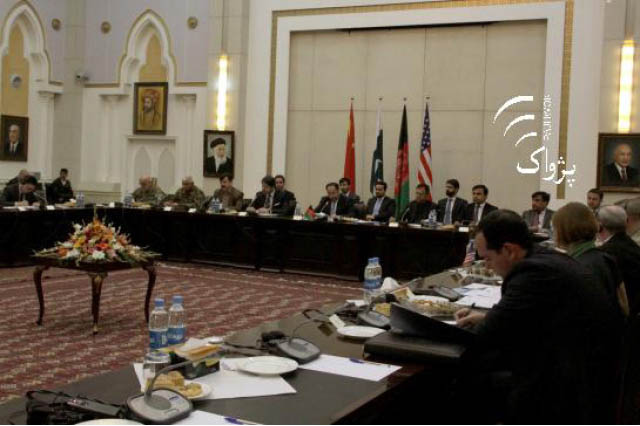Amid concerns about escalation in militancy and civilian casualties, peace talks still make headlines on national and international newspapers. The post-Taliban Afghanistan is considered a democratic state based on approving Constitution, to the international standard, and conducting presidential and provincial elections, as celebration of democracy, and constituted parliament – which is the beating heart of democracy in a state. The public rights and dignity are considered natural and inviolable and any kinds of discrimination and distinction on the grounds of race, sex, color and beliefs are not acceptable at all in the Constitution. People, constitutionally, can exercise their fundamental rights, namely the rights to life, liberty and property, under the spirit of democracy. All are deemed equal before the law and are entitled without any discrimination to equal protection of the law.
The state has committed to found an order based on democracy and people’s will and establish a civil society void of violence and bloodshed on the basis of law, social justice and protecting integrity and human rights and dignity. People’s inalienable rights are highly underscored in the law and the state has promised to reinforce social, political, economic and defensive institutions. The words like “liberty”, “freedom of expression”, “human dignity” and “natural rights” is mentioned frequently in the law and considered state’s responsibility to respect and protect. After all, the United States Charter and Universal Declaration of Human Rights (UDHR) are also recognized in the Constitution.
However, the question is that does the executive branch enforce the law in its true form? Needless to say, people’s rights and dignity are violated on a large scale and they suffer in one way or another. Forming “a civil society void of oppression, atrocity, discrimination as well as violence” is no more than a dream for Afghan nation and people lose their lives on day-to-day happenings such as terrorist attacks and explosions carried out by warring parties, mainly the Taliban and self-proclaimed Islamic State (IS) group. Their rights are trampled upon in the worst possible way. Despite constitutional law, one falls the victim of discrimination, especially in judicial system, on his racial and sexual backgrounds. Based on a survey, lawbreaking has been mostly done by the state rather than the nation. For instance, bribery, administrative corruption, etc. are rife in the government’s machinery – this bitter fact is accepted by the officials.
Afghanistan’s nascent democracy is under serious question since the terrorist attacks have been intensified across the country. An increase in civilian casualty is a matter of great concern for the people. To the unmitigated chagrin of the public, the blood of scores of citizens was spilt flagrantly without any reasons and many more are susceptible to terrorism and insecurity. Moreover, the Taliban’s Omari Operation and emergence of the Islamic Stage group has given a fresh impetus to insecurity in the country. On the other hand, seeking peace talks for more than a decade has reached deadlock and will hardly ever come to fruition – especially as the Taliban has been split in many parties. The government’s good will and declaration for peace have been responded by bullet and non-combatants took the brunt of terror and violence. As a result, a report released by the United Nations says that internal displacement due to conflict has escalated by 40 per cent from 2014 to 2015 in Afghanistan and an increase resurfaced this year. Based on the report, about 118,000 people fled their homes in the first four months of 2016. Hence, democracy will be on the verge of collapse if this trend continues. So, is there still a sense of hope and trust for bringing in security through peace talks?
Since orchestrating talks with the Taliban’s central party, led by Mullah Akhtar Mansour, reached deadlock, Afghan government seeks another door for bringing peace, which is initiating talks with Hezb-i-Islami Afghanistan (HIA) led by Gulbadin Hekmatyar. With almost two-month stay of HIA delegation in Kabul, a draft of peace agreement, which includes 25 issues, has been made and will be sent to the government and militant group’s leaders. The key components of the agreement are said to be lifting sanctions on the HIA and removing names of HIA members from UN and US blacklists, the release of HIA prisoners and allowing the party to openly commence its political activities and resolving the issue of Afghan refugees. Will peace agreement with HIA ensure the rights of Afghan people and support democracy in Afghanistan?
With the Taliban’s splinter group, one of the fighting factions as HIA will not mitigate the security challenges. Therefore, it does not seem a great achievement, if it comes to fruition without any whistle-blowers. In other words, when a peace agreement does not prevent from the Taliban’s spring offensive and civilian casualties, it will not be a real breakthrough. So, how can we talk about peace while the warring parties have intensified their attacks and the graph of mortality remains high? In peace negotiation, the public rights and freedom should be prioritized. The state will have to provide a secure environment for the nation so that they can exercise their rights and dignity without any barriers. Of course peace is vital in a society, but many other challenges such as breaking law, mainly by the influential figures, administrative corruption, etc. should be turned a blind eye. Moreover, the government has to redirect its efforts and energy on seeking peace with more significant parties or take a military deal if not fruitful; otherwise it would be flogging a dead horse.
Home » Opinion » Seeking Peace to Support Democracy
Seeking Peace to Support Democracy
| Hujjatullah Zia

